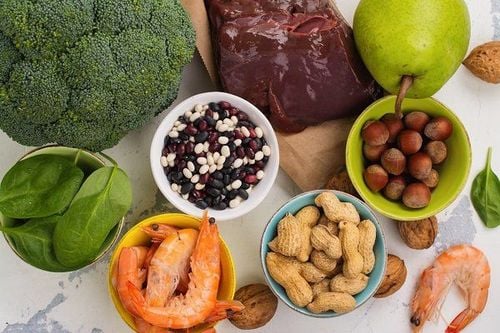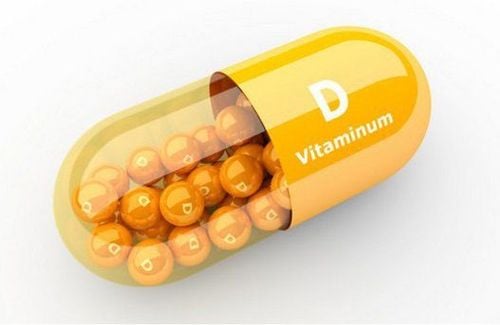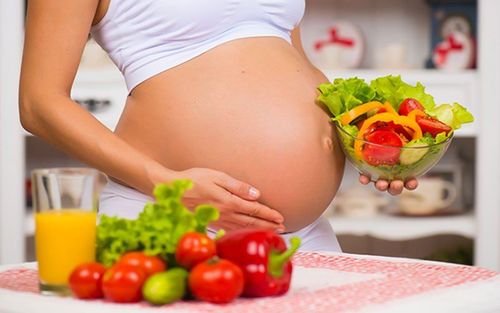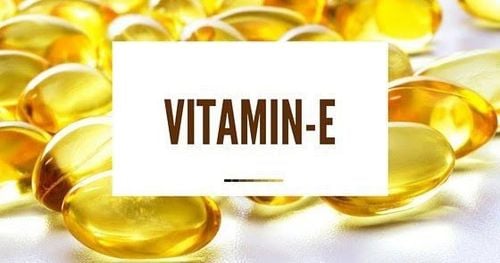This is an automatically translated article.
Pregnancy is a journey of miraculous change. The child's good development will depend on the mother's nutritional care. Besides, preparing and taking good care of both parents before entering the pregnancy process is important for the development of the child. So, what should be noted in the diet before conception and during pregnancy.1. Eat healthy during and before pregnancy
Pregnancy is a special phase of life as diet affects the health of not one but two individuals. Therefore, a healthy and varied pre-pregnancy diet is very important for the health of both mother and baby. A woman's diet before conception can also affect the health of her baby.Pregnant women and women trying to have a baby are advised to eat a healthy, varied and balanced diet similar to that recommended for the average person. In practice, this means following a diet based on starchy foods (choosing whole grains or potatoes with skin when you can), and including lots of fruits and vegetables. , moderate amounts of meat, fish and/or other protein sources (such as eggs and beans), and moderate amounts of dairy products (such as milk, yogurt, or cheese). Foods and drinks high in fat and sugar should only be consumed in limited quantities.

Chế độ ăn uống trước khi mang thai lành mạnh và đa dạng rất quan trọng cho sức khỏe của cả mẹ và con
2. When trying for a baby
Eating healthy when trying to have a baby to ensure optimal fetal development, may necessitate some dietary and lifestyle changes even before conception. During conception, women should take folic acid supplements (400 μg), which should continue until the 12th week of pregnancy. This will reduce the risk of your baby being born with a neural tube defect. Women who are trying to get pregnant should also stop drinking alcohol altogether. Couples who are trying to have children should also stop smoking, as smoking (including secondhand smoke) can reduce a couple's chances of conceiving, but it can also be a risk factor. may harm the unborn baby.Body weight seems to be related to fertility, so if a woman is obese (BMI over 30 kg/m2) or underweight (BMI less than 19 kg/m2) has problems conceiving . These subjects are often advised that achieving a healthy body weight can increase their chances of conceiving.
A few tips for men
Drinking too much alcohol can affect sperm quality and men are advised not to drink more than the recommended 3 to 4 units per day.
Men who smoke are more likely to experience reduced semen quality and stopping smoking can also reduce the impact of passive smoking on their sexual partners. Stopping smoking can increase your chances of conceiving and improve general health.
Obese men (BMI over 30 kg/m2) may also experience reduced fertility and should aim for a healthy body weight to improve their chances of conceiving.
It is important for men to eat a healthy, varied diet. Specific nutrients found in a healthy, varied diet are known to be important for male fertility. For example, selenium is needed to make healthy sperm, zinc is needed to ensure healthy testosterone levels, and the long-chain omega-3 fatty acids found in fatty fish help produce prostaglandins, which are important for making sperm. .
3. Diet while pregnant
Eating healthy during pregnancy there is a common misconception that a pregnant woman's energy needs are substantially higher than her pre-conception energy needs. Some pregnant women think they have to eat for two and are therefore at risk of excessive weight gain during pregnancy.The increase in actual energy requirements is only a relatively small fraction of the energy intake of non-pregnant women. The energy demand in the first and second periods does not change. The dietary reference value for energy intake during pregnancy in the UK is an additional 200 kcal/day in the third trimester only.

Đàn ông ngừng hút thuốc có thể tăng cơ hội thụ thai và cải thiện sức khỏe chung
4. Healthy weight gain during pregnancy
A little weight gain is a sign of a healthy pregnancy. Weight gain includes: the fetus, placenta, amniotic fluid, increased maternal blood and fluids, breast tissue and fat reserves ready for breastfeeding. Gaining a healthy weight during pregnancy will help prevent low birth weight babies and reduce the associated risks. Low birth weight babies are at increased risk of various diseases in adulthood, such as heart disease, high blood pressure, and type 2 diabetes.Many pregnant women seek medical advice from a health professional about which factors make up. appropriate weight gain during pregnancy. However, there are no UK evidence-based guidelines for the recommended range of weight gain during pregnancy. Indeed, weight gain during pregnancy varies widely between individuals. The average weight gain during pregnancy is about 10 - 12.5 kg.
However, the appropriate level of weight gain for women depends on their pre-pregnancy weight. Low birth weight women are especially encouraged to gain minimal weight to avoid having a low birth weight baby. Women who are overweight or obese before conception may need to lose weight.
Avoid excessive weight gain. Women who gain too much weight during pregnancy are at increased risk of complications related to overweight and obesity. These include gestational diabetes, miscarriage, preeclampsia, thromboembolism (blood clot), and maternal death. The risk of complications during labor and the risk of an emergency cesarean delivery is also increased. In addition, babies born to obese mothers are also at increased risk of stillbirth, stillbirth, birth defects and obesity later in life. Excessive weight gain during pregnancy also easily leads to overweight and obesity in the mother after birth.
However, dieting to lose weight during pregnancy is not advisable. An inadequate supply of energy and nutrients can adversely affect the development and health of the fetus. Instead, weight gain during pregnancy should be controlled, through eating a healthy, balanced diet and participating in physical activity to maximize the health of mother and baby.
5. Some substances need to be supplemented before conception and during pregnancy
5.1. Folate / folic acid
Low maternal folate status in early pregnancy is associated with an increased risk of the baby being born with a neural tube defect (NTD), such as spina bifida. Therefore, it is necessary to supplement folic acid for pregnant women.The embryonic spine reaches a critical stage in early pregnancy and this is when the mother's folate enough status is most important. During the 3rd and 4th weeks of pregnancy, the central nervous system, first developing as a flat sheet of cells (neural plate), coils up (neural tube) and closes to form the central nervous system. . If the tube does not close properly, this will lead to an NTD. NTDs are a group of serious birth defects that affect the developing nervous system (eg, spina bifida). Currently, the exact cause of NTDs is unknown and research continues. However, folic acid supplementation (400 μg daily) before and during the first 12 weeks of pregnancy may reduce the risk of NTDs. The risk of NTDs is increased if there is a family history of NTDs or if the mother has diabetes, and higher doses of folic acid may be needed in these cases. If you're taking anti-seizure medication, a higher amount of folic acid may also be needed.
A healthy varied diet rich in folate is also important during the first 12 weeks of pregnancy and before conception. Sources are oranges, berries, green leafy vegetables, beets, beans and brown bread.
5.2. Vitamin D
Vitamin D is important for the development of bone mass and bone health. There have been reports of rickets, a clinical sign of vitamin D deficiency, resurfacing in some populations in the UK. The main source of vitamin D is synthesized by the skin through exposure to sunlight. In the UK, during the summer months there is enough sunlight of the appropriate wavelength UV rays for the skin to synthesize enough vitamin D but between October and April the wavelength of sunlight is not suitable for synthesis. vitamin D. Food sources are quite limited; Good sources include oily fish, eggs and foods fortified with vitamin D (such as some breakfast cereals). Pregnant women who cover their skin when outdoors, have darker skin (for example, people of African, Afro-Caribbean, or South Asian descent), or spend a lot of time indoors, are at higher risk of vitamin D deficiency. Vitamin D deficiency during pregnancy can adversely affect fetal bone development and may also limit the accumulation of vitamin D stores in the first months of life. Therefore, all pregnant women should take a daily supplement of 10 μg of vitamin D throughout pregnancy.
Vitamin D rất quan trọng đối với sự phát triển của khối lượng xương và sức khỏe của xương
5.3. Iron
Eat plenty of iron-rich foods. During pregnancy, extra iron is needed to support the growth and development of the fetus, the development of the placenta, the expansion of the mother's red blood cell mass, and to cover the amount of iron lost in the blood during pregnancy. born. However, there is iron savings during pregnancy due to the absence of menstruation and because the rate of iron absorption from food is also often increased. Therefore, no formal recommendations for an increase in pregnancy have been made. But some groups of women may already have low iron absorption before pregnancy and are therefore at risk for anemia. Iron-deficiency anemia during pregnancy can increase the risk of a baby being born with low birth weight and developing iron-deficiency anemia in the first few months of life. As a result, greater priority should be given to iron intake when advising young women on healthy eating to help ensure that those entering pregnancy have adequate amounts. Similarly, throughout pregnancy, women are advised to eat more foods high in iron. Good sources of iron include red meat (such as beef and lamb), beans, nuts, eggs, green leafy vegetables such as watercress, whole-wheat bread, dried fruit, and fortified foods such as watercress. breakfast cereal. Vitamin C helps the body absorb iron from plant sources. So, eating foods or beverages that contain vitamin C, for example, a 150ml glass of unsweetened fruit juice at the same time as a meal containing iron from a plant source can help the body absorb more iron. Tea and coffee can reduce the amount of iron absorbed from plant foods eaten at the same meal. Women with low iron levels may be advised by their doctor to take an iron supplement.5.4. Vitamin A
Although vitamin A is essential for good health and essential for fetal development, large amounts during pregnancy are associated with a higher risk of birth defects. Pregnant women are advised not to take vitamin A supplements, cod liver oil supplements, or multivitamin supplements that contain vitamin A. Liver and liver products can also be high in vitamin A and should be avoided during pregnancy. pregnancy.Vinmec currently has many comprehensive health care programs for couples, pregnant mothers and their unborn babies, including basic pre-marital examination packages, advanced pre-marital examination packages, and full maternity programs. package . Vinmec has a team of experienced doctors in the fields of obstetrics and gynecology, IVF, stem cells, gene technology, capable of synchronously and comprehensively deploying the most advanced assisted reproductive techniques today.
For specific information about fertility and maternity packages at Vinmec, please contact the hospitals and clinics of Vinmec health system nationwide.
Please dial HOTLINE for more information or register for an appointment HERE. Download MyVinmec app to make appointments faster and to manage your bookings easily.
Reference source: nutrition.org.uk












